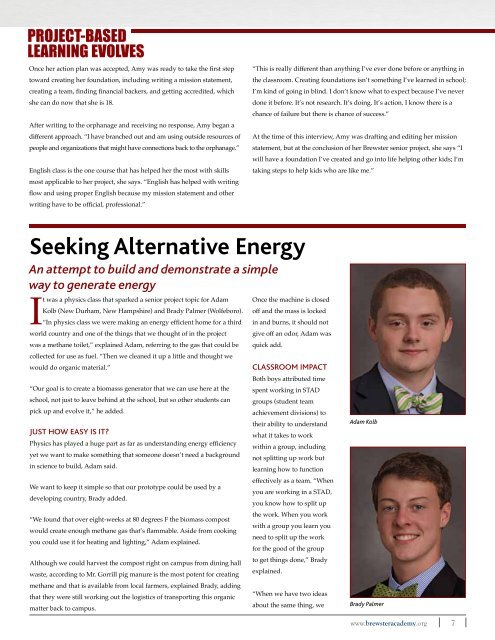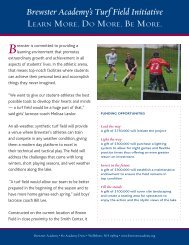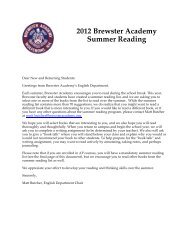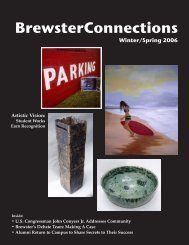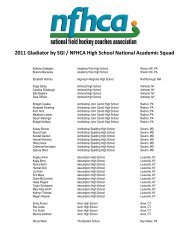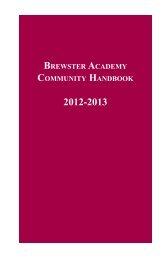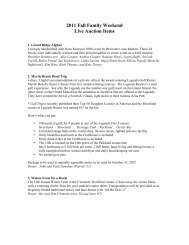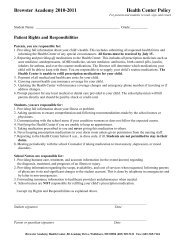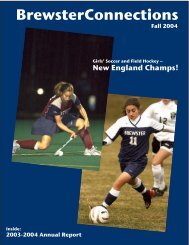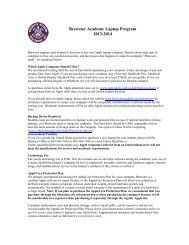BrewsterConnections(PDF) - Brewster Academy
BrewsterConnections(PDF) - Brewster Academy
BrewsterConnections(PDF) - Brewster Academy
You also want an ePaper? Increase the reach of your titles
YUMPU automatically turns print PDFs into web optimized ePapers that Google loves.
Project-Based<br />
Learning Evolves<br />
Once her action plan was accepted, Amy was ready to take the first step<br />
toward creating her foundation, including writing a mission statement,<br />
creating a team, finding financial backers, and getting accredited, which<br />
she can do now that she is 18.<br />
After writing to the orphanage and receiving no response, Amy began a<br />
different approach. “I have branched out and am using outside resources of<br />
people and organizations that might have connections back to the orphanage.”<br />
English class is the one course that has helped her the most with skills<br />
most applicable to her project, she says. “English has helped with writing<br />
flow and using proper English because my mission statement and other<br />
writing have to be official, professional.”<br />
“This is really different than anything I’ve ever done before or anything in<br />
the classroom. Creating foundations isn’t something I’ve learned in school;<br />
I’m kind of going in blind. I don’t know what to expect because I’ve never<br />
done it before. It’s not research. It’s doing. It’s action. I know there is a<br />
chance of failure but there is chance of success.”<br />
At the time of this interview, Amy was drafting and editing her mission<br />
statement, but at the conclusion of her <strong>Brewster</strong> senior project, she says “I<br />
will have a foundation I’ve created and go into life helping other kids; I’m<br />
taking steps to help kids who are like me.”<br />
Seeking Alternative Energy<br />
An attempt to build and demonstrate a simple<br />
way to generate energy<br />
It was a physics class that sparked a senior project topic for Adam<br />
Kolb (New Durham, New Hampshire) and Brady Palmer (Wolfeboro).<br />
“In physics class we were making an energy efficient home for a third<br />
world country and one of the things that we thought of in the project<br />
was a methane toilet,” explained Adam, referring to the gas that could be<br />
collected for use as fuel. “Then we cleaned it up a little and thought we<br />
would do organic material.”<br />
“Our goal is to create a biomasss generator that we can use here at the<br />
school, not just to leave behind at the school, but so other students can<br />
pick up and evolve it,” he added.<br />
Just how easy is it?<br />
Physics has played a huge part as far as understanding energy efficiency<br />
yet we want to make something that someone doesn’t need a background<br />
in science to build, Adam said.<br />
We want to keep it simple so that our prototype could be used by a<br />
developing country, Brady added.<br />
“We found that over eight-weeks at 80 degrees F the biomass compost<br />
would create enough methane gas that’s flammable. Aside from cooking<br />
you could use it for heating and lighting,” Adam explained.<br />
Although we could harvest the compost right on campus from dining hall<br />
waste, according to Mr. Gorrill pig manure is the most potent for creating<br />
methane and that is available from local farmers, explained Brady, adding<br />
that they were still working out the logistics of transporting this organic<br />
matter back to campus.<br />
Once the machine is closed<br />
off and the mass is locked<br />
in and burns, it should not<br />
give off an odor, Adam was<br />
quick add.<br />
Classroom Impact<br />
Both boys attributed time<br />
spent working in STAD<br />
groups (student team<br />
achievement divisions) to<br />
their ability to understand<br />
what it takes to work<br />
within a group, including<br />
not splitting up work but<br />
learning how to function<br />
effectively as a team. “When<br />
you are working in a STAD,<br />
you know how to split up<br />
the work. When you work<br />
with a group you learn you<br />
need to split up the work<br />
for the good of the group<br />
to get things done,” Brady<br />
explained.<br />
“When we have two ideas<br />
about the same thing, we<br />
Adam Kolb<br />
Brady Palmer<br />
www.brewsteracademy.org<br />
7


